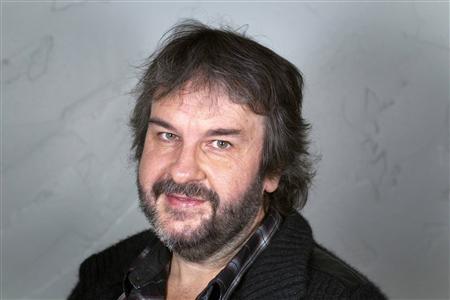Bullied as a kid, Peter Jackson fights back on film
Updated: 2012-01-22 15:48
(Agencies)
|
|||||||||||
 |
|
Peter Jackson, a producer of the film ''West of Memphis'', poses for a portrait during the Sundance Film Festival in Park City, Utah January 21, 2012.[Photo/Agencies] |
The high-profile case of the West Memphis Three murderers might seem like an odd choice of films for director Peter Jackson, but the "Lord of the Rings" maker has come to Sundance with a documentary about the case and a new revelation of a possible suspect.
Jackson, who helped bankroll the defense of the three convicted killers who are now out of jail nearly 20 years after the crime, and the legal team claim they have testimony that the stepfather of one of the victims is the real murderer.
Whether that allegation eventually proves true will await prosecutors' action in West Memphis, Arkansas where the murders took place in 1993, and so far the prosecution has stuck by its belief they had the right culprits all along.
But where Jackson and one of the West Memphis Three, Damien Echols, are concerned, their documentary "West of Memphis" and this new testimony takes the fight further.
"It's got to be dealt with," Jackson told Reuters on Saturday at the Sundance Film Festival. "You can't just leave a murder case like that hanging in the air."
The high-profile case of the West Memphis Three who were tried and convicted as teens of murdering three boys prompted a call to action for Jackson when first told the disturbing tale of the young men linked to a grisly murder who were ultimately released from prison in August 2011.
"I was bullied and regarded as little bit of an oddball myself," Jackson told Reuters on Saturday. "And I see that happening to somebody else, so I just want to help them."
Jackson and director Amy Berg debuted "West of Memphis" at Sundance on Friday, and simultaneously defense lawyers issued a press release detailing their new revelations.
The documentary follows the case of what many believe was the wrongful conviction of Echols, Jason Baldwin and Jessie Misskelley, who were teenagers when they were accused of killing three 8-year-old boys in West Memphis, Arkansas in 1993.
The case already has been made famous by the HBO documentary series "Paradise Lost," but the story of the three jailed boys struck a chord in the Jackson and his wife and producing partner Fran Walsh as far back as 2005.
"It's an American story but it's a human story as well," Jackson said. "When you look at the original 'Paradise Lost' film, you see three kids who can't defend themselves, being persecuted in a medieval way -- witchcraft, satanic worship. It was kind of primitive. It makes you angry, so Fran and I contacted (Echols' wife) Lorri Davis and asked what we could do to help."
Jackson said he and Walsh funded the defense team's investigation anonymously, spending "more than thousands" of dollars paying bills for such things as DNA tests and sending investigators to interview additional witnesses.
"We're still doing that," Jackson said.
Only one week ago, he said, the filmmakers shot and edited the new revelation into the documentary, but they had no time to include the footage in early screenings.
NEW REVELATION
According to Jackson, Echols and the defense team, the nephew of Terry Hobbs -- Michael Hobbs, Jr. -- has told friends that his uncle committed the crime. Terry Hobbs' stepson, Stevie Branch, was among the murder victims.
Hobbs has long denied any wrongdoing and police have never considered him a suspect, according to media reports. Reuters was unable to reach Hobbs for comment.
For Jackson, the idea of actually making a documentary on the West Memphis Three didn't arise until 2008, after DNA and forensic findings paid for by Jackson and Walsh, were dismissed by the original judge presiding over the trial. He found the evidence as not being compelling enough to reopen the case.
"Whenever new evidence came and we tried to present it to the judge, he refused to hear it," said Echols, now 37. He and his wife are producers on the film alongside Jackson and Walsh.
"The only way to let the public know what was going on with this case was by doing a documentary. It was Peter's idea of 'well, why don't we get this evidence out to the public if the courts are going to refuse to hear it?'"
"West of Memphis" follows the three convicted killers until just after they were released last August in a legal maneuver known as an "Alford Plea," whereby the men plead guilty in their own best interest while asserting innocence.
But the trio, their families, their lawyers, Jackson, Walsh and director Berg haven't stopped fighting.
"You have to push this hard in order to get a reaction," said Berg. "I feel that we have gone further than anybody else has gone and we've put it out there for people to act."
The film received strong initial reviews from critics here at Sundance. The Hollywood Reporter labeled it a "gripping overall picture of the West Memphis 3 wrongful-conviction saga" and summed up, "Thorny, blood-boiling and finely made, it deserves a theatrical push."
Today's Top News
President Xi confident in recovery from quake
H7N9 update: 104 cases, 21 deaths
Telecom workers restore links
Coal mine blast kills 18 in Jilin
Intl scholarship puts China on the map
More bird flu patients discharged
Gold loses sheen, but still a safe bet
US 'turns blind eye to human rights'
Hot Topics
Lunar probe , China growth forecasts, Emission rules get tougher, China seen through 'colored lens', International board,
Editor's Picks

|

|

|

|

|

|





